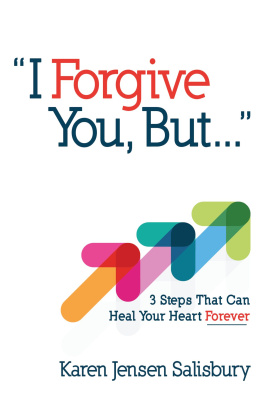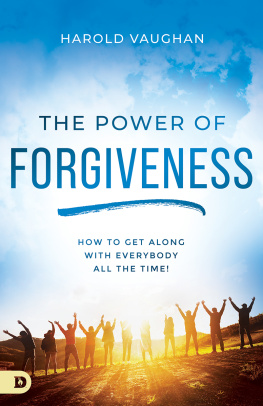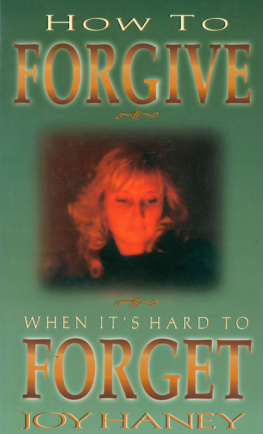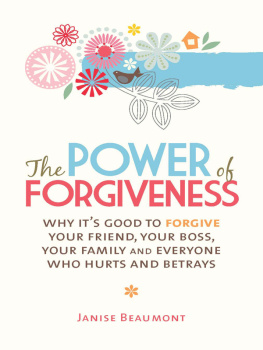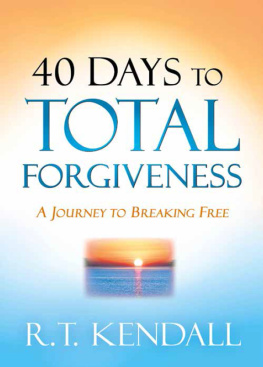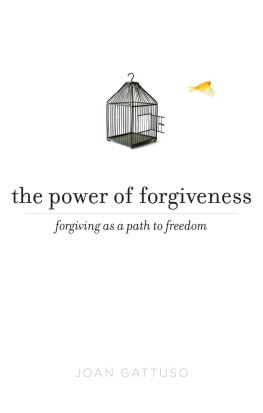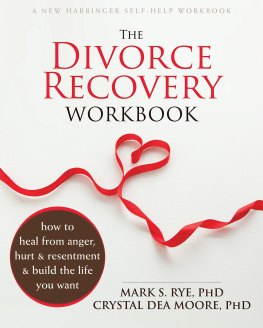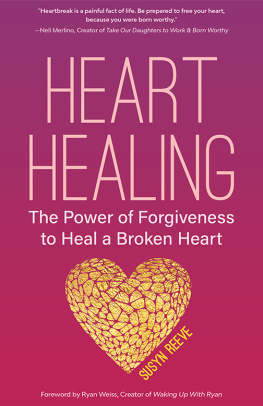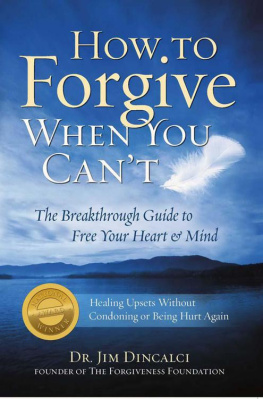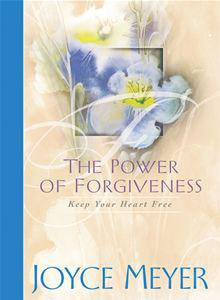FINDING FORGIVENESS
FINDING FORGIVENESS
A 7-Step Program for Letting Go of Anger and Bitterness
Eileen R. Borris-Dunchunstang, Ed.D.


Copyright 2007 by McGraw-Hill Companies, Inc. All rights reserved. Except as permitted under the United States Copyright Act of 1976, no part of this publication may be reproduced or distributed in any form or by any means, or stored in a database or retrieval system, without the prior written permission of the publisher.
ISBN: 978-0-07-177356-0
MHID: 0-07-177356-8
The material in this eBook also appears in the print version of this title: ISBN: 978-0-07-171375-7, MHID: 0-07-171375-1.
All trademarks are trademarks of their respective owners. Rather than put a trademark symbol after every occurrence of a trademarked name, we use names in an editorial fashion only, and to the benefit of the trademark owner, with no intention of infringement of the trademark. Where such designations appear in this book, they have been printed with initial caps.
McGraw-Hill eBooks are available at special quantity discounts to use as premiums and sales promotions, or for use in corporate training programs. To contact a representative please e-mail us at bulksales@mcgraw-hill.com.
TERMS OF USE
This is a copyrighted work and The McGraw-Hill Companies, Inc. (McGraw-Hill) and its licensors reserve all rights in and to the work. Use of this work is subject to these terms. Except as permitted under the Copyright Act of 1976 and the right to store and retrieve one copy of the work, you may not decompile, disassemble, reverse engineer, reproduce, modify, create derivative works based upon, transmit, distribute, disseminate, sell, publish or sublicense the work or any part of it without McGraw-Hills prior consent. You may use the work for your own noncommercial and personal use; any other use of the work is strictly prohibited. Your right to use the work may be terminated if you fail to comply with these terms.
THE WORK IS PROVIDED AS IS. McGRAW-HILL AND ITS LICENSORS MAKE NO GUARANTEES OR WARRANTIES AS TO THE ACCURACY, ADEQUACY OR COMPLETENESS OF OR RESULTS TO BE OBTAINED FROM USING THE WORK, INCLUDING ANY INFORMATION THAT CAN BE ACCESSED THROUGH THE WORK VIA HYPERLINK OR OTHERWISE, AND EXPRESSLY DISCLAIM ANY WARRANTY, EXPRESS OR IMPLIED, INCLUDING BUT NOT LIMITED TO IMPLIED WARRANTIES OF MERCHANTABILITY OR FITNESS FOR A PARTICULAR PURPOSE. McGraw-Hill and its licensors do not warrant or guarantee that the functions contained in the work will meet your requirements or that its operation will be uninterrupted or error free. Neither McGraw-Hill nor its licensors shall be liable to you or anyone else for any inaccuracy, error or omission, regardless of cause, in the work or for any damages resulting there from. McGraw-Hill has no responsibility for the content of any information accessed through the work. Under no circumstances shall McGraw-Hill and/or its licensors be liable for any indirect, incidental, special, punitive, consequential or similar damages that result from the use of or inability to use the work, even if any of them has been advised of the possibility of such damages. This limitation of liability shall apply to any claim or cause whatsoever whether such claim or cause arises in contract, tort or otherwise.
In loving memory of my parents, Sarah Mayrsohn and Henry Borris
Contents
by His Holiness the Dalai Lama
Why Should We Forgive?
1
How Do We Forgive?
2
Learning to Forgive
The Seven-Step Forgiveness Program
3
Beginning the Journey
The Struggle with Sweet Revenge
4
Developing Patience
Learning from the Dalai Lama
5
Poor Me
Larry Mathiss Story
6
Working with Anger
Kate Wilsons Story
7
Understanding the Impact of Guilt
8
Stop Running and Face Your Guilt!
Ed Minamis Story
9
Releasing Our Pain
Azim Khamisas Story
10
Listening Within
Irene Laures Story
11
Breaking Cycles of Violence
A New Beginning
12
The Power of Love
Yusuf Al-Azharis Story
13
A Justice That Heals
14
With Love We Can Heal the Future
John Plummers Story
15
What You Can Do for Yourself
Foreword
by His Holiness the Dalai Lama
IN THE COURSE of our lives we often make misguided decisions that harm ourselves or others. We do this out of ignorance. We think that a certain mode of behavior will bring us happiness when in fact it brings us suffering. Feelings of self-righteous anger and the urge for revenge may sometimes lead us to harm others in the mistaken conviction that it will benefit us and bring us some form of happiness. Actually, it creates suffering not only for the victims of our deeds but also for us. However justified we may feel, doing others harm, even in the name of revenge, severely disturbs our own peace of mind and creates conditions for our own suffering.
Human beings need to live together and are dependent on each other in many essential ways. In human society we, therefore, need moral codes of behavior in order to live in peace and harmony with one another. Although victims may have a psychological need to feel that justice is being done, the infliction of pain on someone else only serves to add to the suffering already done and does not increase the potential for happiness of anyone involved. Instead of revenge, it is the notion of forgiveness that should be encouraged and developed.
If we truly act out of concern for others well-being we will recognize the potential impact of our actions on others and order our conduct accordingly. When we become angry, we stop being compassionate, loving, generous, forgiving, tolerant, and patient altogether. We deprive ourselves of the very things that happiness consists of. And not only does anger immediately destroy our critical faculties, it tends toward rage, spite, hatred, and maliceeach of which is always negative because it is a direct cause of harm to others.
If, on the other hand, we can let go of anger and hatred, if we can apply reasoning to analyze the situation, adopt a wider perspective and look at other angles of the situation, the end resultthe product of patience and toleranceis forgiveness. When we are truly patient and tolerant, then forgiveness comes naturally.
Although we may have experienced deep hurt in the past, with the development of patience and tolerance it is possible to let go of our sense of anger and resentment. If we analyze the situation, it is possible to realize that the past is past, that continuing to feel anger and hatred serves no purpose. They do not change the situation, but just give rise to further disturbance within our minds and cause our continued unhappiness. Of course, we may still remember what happened, but forgetting and forgiving are two different things. Theres nothing wrong with simply remembering what happened, but with the development of forgiveness, its possible to let go of the negative feelings associated with what took place. This is why the author of this book, Eileen R. Borris-Dunchunstang, has referred to forgiveness as the ultimate freedom. Forgiveness is not about letting off the perpetrator of some wrong; it is about freeing the victim. If you can forgive, you no longer have to concern yourself with who did what to you and how you are going to make them pay for it. You will be free of that entire burden.
Next page

